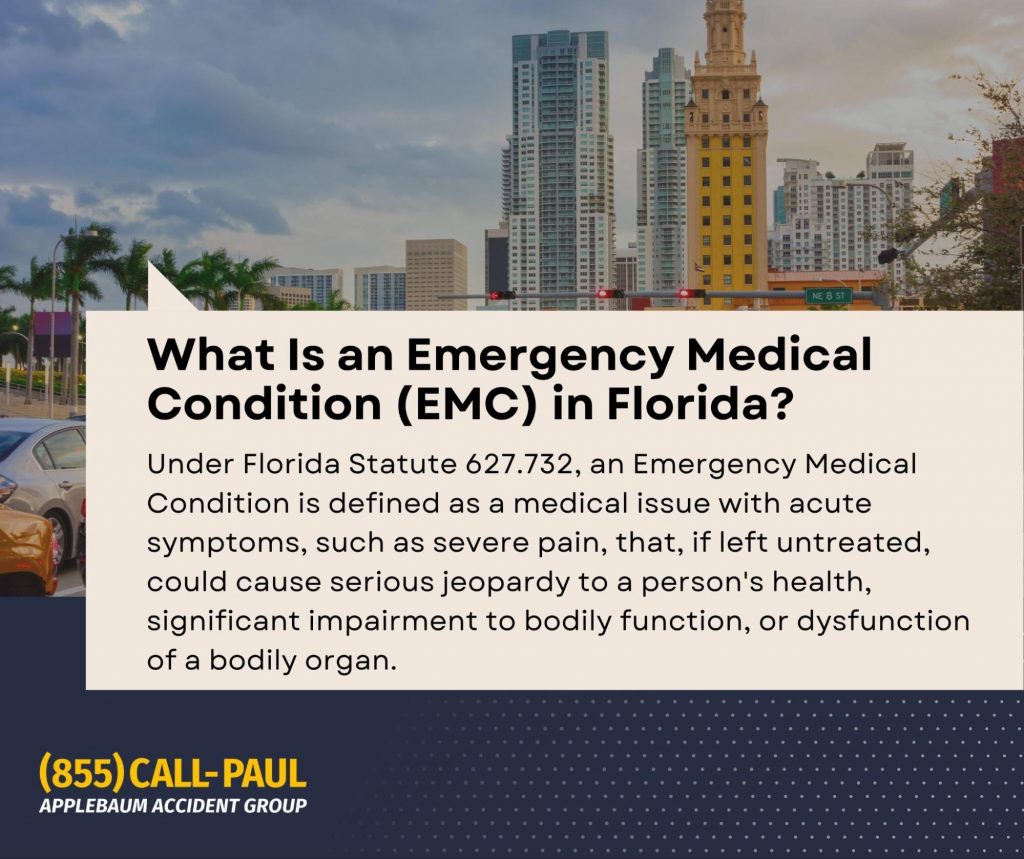An EMC evaluation is a medical assessment conducted after a Florida car accident to determine if injuries qualify as an Emergency Medical Condition (EMC). This evaluation is required to unlock the full $10,000 of Personal Injury Protection (PIP) insurance benefits.
Why does this matter? Without an EMC evaluation, your PIP benefits are automatically capped at $2,500, limiting your access to necessary medical care after an accident.
In this article, you’ll learn what EMC means both medically and in billing, why the evaluation is required, how it works, who is qualified to perform it, and practical answers to the real questions and worries many accident victims face.
EMC Meaning in Medical Terms

An Emergency Medical Condition (EMC) refers to a medical state where immediate care is necessary to prevent serious jeopardy to health, significant impairment of bodily functions, or dysfunction of any body part or organ. In the context of Florida car accidents, this determination is pivotal because it influences how much PIP coverage you can access.
Medical providers use specific criteria outlined in Florida Statutes § 627.732 to determine whether a patient’s injuries meet the EMC threshold.
The statute defines EMC as an acute condition that requires immediate medical attention to avoid significant health risks. This includes scenarios like severe bleeding, fractured bones, or organ damage.
It’s important to clarify a common misconception: EMC does not automatically mean you need to visit an emergency room.
Many people believe that going to the ER equals EMC status, but this is not accurate. The determination is about the medical severity of your condition, not where you receive treatment.
A qualified provider may diagnose an EMC during follow-up visits, urgent care, or specialized medical assessments.
What Does EMC Stand For in Billing?
In medical billing, EMC is the key that unlocks the full extent of your PIP benefits. When a medical provider documents that your injury qualifies as an EMC, your insurance company is obligated to provide up to $10,000 in medical coverage under Florida’s no-fault laws.
Without EMC status, your benefits are limited to $2,500, which often proves insufficient for treating moderate to severe injuries resulting from car accidents.
Why do insurers require formal documentation? The statutory language and insurance regulations demand that the EMC status is clearly stated in your medical records. There is no standardized EMC form. Instead, providers must explicitly note in their charting that the patient’s condition qualifies as an EMC based on statutory criteria. This documentation becomes the basis for insurance processing and reimbursement.
Failing to secure proper EMC documentation can severely limit both your access to care and your ability to recover adequate compensation.
Do You Need an EMC Evaluation?
Without an EMC evaluation, your access to PIP benefits is automatically restricted to $2,500. This amount might cover an initial ER visit or a couple of therapy sessions but will fall short for more serious injuries requiring extended treatment.
With a valid EMC evaluation, you unlock access to the full $10,000 in medical benefits, allowing for a broader range of necessary treatments such as diagnostic imaging, physical therapy, chiropractic care, or specialist consultations.
This evaluation is also a legal requirement under Florida’s no-fault insurance laws.
Regardless of who was at fault in the accident, you must meet specific procedural steps, including obtaining an EMC evaluation, to claim your full PIP benefits.
The 14-Day Treatment Deadline
Florida law mandates that you seek medical treatment within 14 days of the accident to qualify for any PIP benefits. However, there’s frequent confusion here: the EMC determination itself does not have to be made within this 14-day window. It can be made later, as your condition evolves or more severe symptoms emerge.
If you’re worried about the 14-day window, read the full article on Florida 14-day Accident Law.
Failing to act within these timelines can jeopardize both your medical recovery and your financial compensation.
What Happens If Insurers Dispute the EMC Status?
It’s not uncommon for insurance companies to question the legitimacy of an EMC determination. This skepticism is often driven by an attempt to limit payouts. Even when a qualified provider makes the EMC diagnosis based on statutory criteria, insurers may argue that the injuries do not meet the threshold of an Emergency Medical Condition.
When this happens, legal teams play a vital role in countering insurer denials. Here’s how they typically respond:
- Arrange for an independent medical evaluation to provide a second opinion that reinforces the initial EMC diagnosis.
- Provide expert testimony to validate the severity of the injury and justify the EMC determination.
- Challenge the insurer’s arguments by presenting detailed medical records, physician notes, and statutory interpretations that support the claim.
Without professional advocacy, injured parties may find it difficult to navigate these disputes, risking reduced compensation and limited access to necessary care.
For more insight into how your medical expenses get paid, even when there are disputes, see our article on Who Pays Car Accident Medical Bills in Florida?
The Role of Telemedicine in EMC Evaluations
In recent years, there has been a growing acceptance of telemedicine for EMC evaluations. Remote assessments can make it easier and quicker for accident victims to obtain an EMC determination, especially those with mobility limitations or in areas with limited access to specialists.
Possible worry: “Will insurers accept a telemedicine EMC evaluation?”
Answer: Many insurers do recognize EMC determinations made via telehealth, but not all. It is essential to check your insurer’s policy beforehand. If your telemedicine evaluation is challenged, obtaining legal assistance may be necessary to defend the validity of your claim and protect your access to full PIP benefits.
Misunderstandings About EMC Evaluations
Does an ER Visit Automatically Mean EMC?
No. This is a common misconception. Simply visiting the emergency room does not guarantee that your condition will be classified as an Emergency Medical Condition. EMC status is determined through medical judgment and must meet specific statutory criteria.
The confusion often arises because people equate the word “emergency” with the act of going to an ER. However, EMC determinations focus on the nature and severity of the injury, not where the care was provided.
Is There a Special EMC Form?
No, there is no official EMC form that providers must fill out. Instead, the EMC status must be clearly documented in your medical records by the evaluating provider. This typically takes the form of a narrative statement confirming that, based on their professional judgment, your condition meets the legal definition of an Emergency Medical Condition.
The lack of a standardized form often leads to confusion and disputes with insurers.
Some providers may be hesitant or inconsistent in how they document EMC status, which can make claims vulnerable to denial or delay. This reinforces the importance of choosing a provider experienced in handling PIP-related evaluations.
Key Takeaways About EMC Evaluations in Florida
- EMC evaluations are required to access the full $10,000 of PIP benefits under Florida law.
- Evaluations must be performed by qualified providers such as physicians, PAs, or ARNPs.
- EMC evaluations play a key role in ensuring that your medical expenses are covered after an accident.
- Given the potential for insurer disputes, it’s advisable to seek legal guidance to safeguard your rights and ensure you receive the full compensation you’re entitled to.
Need Help After Your Florida Car Accident?
At Applebaum Accident Group, we understand how confusing and stressful it can be to navigate the aftermath of a car accident, especially when dealing with insurance companies, medical providers, and legal deadlines. That’s why we make the EMC evaluation process simple and straightforward.
Here’s how we can help:
- We connect accident victims with qualified medical providers who are experienced in conducting EMC evaluations that comply with Florida’s legal and insurance standards.
- We link you with aggressive, experienced attorneys who will fight to ensure you receive your full compensation, challenging any insurer denials and protecting your rights throughout the claims process.
- Our team provides seamless support through medical coordination and case strategy, ensuring that you not only receive the necessary medical care but also that your case is prepared for a successful resolution.
With Applebaum Accident Group’s assistance, you’ll secure the EMC evaluation necessary to unlock your full Personal Injury Protection (PIP) benefits and gain access to expert legal support. What might otherwise feel like a complex, overwhelming process will transform into a clear, organized path toward recovery and the compensation you deserve.
You don’t have to go through this alone.
📞 855-225-5728 | Request An Appointment





